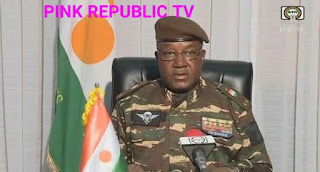Niger’s putschists named an army general as the new leader of the unstable jihadist-hit nation on Friday and warned that any foreign military intervention would lead to chaos.
General Abdourahamane Tchiani, head of the Presidential Guard since 2011, appeared on state television saying he was the “president of the National Council for the Safeguard of the Homeland”.
The general, who is in his 50s and has previously kept out of public life, presented the coup as a response to “the degradation of the security situation” linked to jihadist bloodshed.
He questioned “the sense and scope of a security approach to the fight against terrorism which excludes any real collaboration with Burkina Faso and Mali,” neighbours which face similar threats.
But the putschists, who have faced international condemnation for taking power from a democratically elected president, also warned of “the consequences that will flow from any foreign military intervention”.
On the third day since President Mohamed Bazoum was detained, former colonial master France demanded the restoration of the government saying it “does not recognise” the putschists, and calling Bazoum the “sole president”.
The coup has prompted mounting concern and Kenyan President William Ruto called the army takeover “a serious setback” for Africa.
“The aspirations of the people of Niger for constitutional democracy were subverted by an unconstitutional change of government,” he said in a video message.
Meanwhile, West African leaders will meet Sunday in the Nigerian capital Abuja to discuss the coup, Nigerian President Bola Tinubu said.
“ECOWAS and the international community would do everything to defend democracy and ensure democratic governance continues to take firm root in the region,” Tinubu, who is also the chairman of The Economic Community of West African States regional bloc said in a statement.
The European Union threatened to cut aid to Niamey after what it said was a “serious attack on stability and democracy”.
Bazoum and his family have been confined since Wednesday morning to their residence at the presidential palace located within the 700-strong Presidential Guard’s military camp.
He is said to be in good health and has been able to talk by telephone to other heads of state.
Human Rights Watch (HRW) warned that rights were at risk.
“The military authorities should promptly provide a specific timeline for the return to democratic civilian rule and uphold the right of all Nigeriens to elect their leaders,” said HRW.
The Guard’s chiefs who staged the coup by Thursday had won broad army support.
Armed forces chief General Abdou Sidikou Issa swung his weight behind the putsch saying it was “in order to avoid a deadly confrontation”.
The latest target of a coup in Africa’s turbulent Sahel, Bazoum has tried to stand his ground as condemnations swelled from African and international organisations, allies Germany and the United States, as well as France.
French Foreign Minister Catherine Colonna had seemed to hold out hope for the president’s position.
“If you hear me talking about an attempted coup, it’s because we don’t consider things final,” she said. “There is still a way out if those responsible listen to the international community.”
France, which has 1,500 soldiers in Niger, would support sanctions, she added.
The landlocked state is one of the world’s poorest. Since gaining independence in 1960, it has seen four coups as well as numerous other attempts — including two previously against Bazoum.
The 63-year-old is one of a dwindling group of elected presidents and pro-Western leaders in the Sahel, where a jihadist insurgency has triggered coups in Mali and Burkina Faso.
Their juntas have forced out French troops, and in Mali the ruling military has woven a close alliance with Russia.
“What happened in Niger is nothing more than the struggle of the people of Niger against colonisers, who tried to impose their own rules of life,” Wagner boss Yevgeny Prigozhin said Thursday night in a message shared by a Russian body linked to the mercenary group.
Bazoum took office after elections two years ago, in Niger’s first peaceful transfer of power since independence.
The country of 22 million people is two-thirds desert and frequently ranks at the bottom of the UN’s Human Development Index.




Comments
Post a Comment